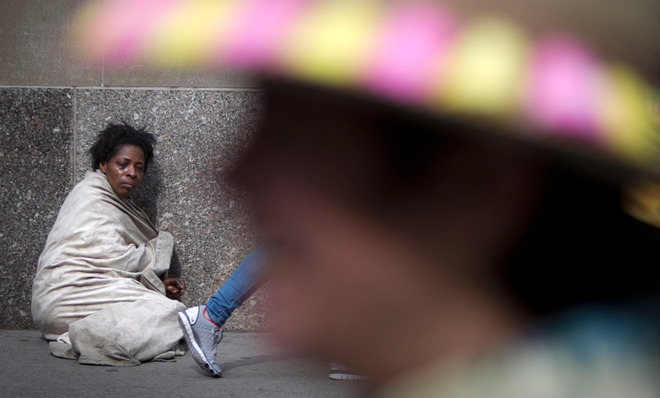Sorry, conservatives: America is not even close to being a colorblind country
Ta-Nehisi Coates' monumental essay on black reparations in The Atlantic demolishes the idea that the civil rights struggle is behind us


A free daily email with the biggest news stories of the day – and the best features from TheWeek.com
You are now subscribed
Your newsletter sign-up was successful
Last summer, the Supreme Court struck down part of the 1965 Voting Rights Act that required certain (mostly southern) states with a history of voting discrimination to get federal approval before changing their voting rules. "Our country has changed," Chief Justice John Roberts declared. Racial discrimination, according to Roberts, had subsided enough that it was unfair to burden the South with civil rights-era scrutiny.
Six years earlier, the court struck down voluntary school desegregation plans in Louisville and Seattle. Roberts famously chided that "the way to stop discrimination on the basis of race is to stop discriminating on the basis of race."
To the court's conservatives, policymaking needed to catch up with all of the racial progress we have made. Never mind the ensuing proliferation of discriminatory voting laws, or the continued rise of school re-segregation. Policymaking needed to become colorblind.
The Week
Escape your echo chamber. Get the facts behind the news, plus analysis from multiple perspectives.

Sign up for The Week's Free Newsletters
From our morning news briefing to a weekly Good News Newsletter, get the best of The Week delivered directly to your inbox.
From our morning news briefing to a weekly Good News Newsletter, get the best of The Week delivered directly to your inbox.
Enter Ta-Nehisi Coates. In an essay in The Atlantic called "The Case for Reparations," Coates masterfully chronicles the weight of disadvantage thrust upon black Americans throughout U.S. history, from slavery to Jim Crow to redlining to subprime lending.
Coates' protagonist is a 90-year-old black Chicagoan named Clyde Ross. Like many African-Americans of his time, Ross was born to sharecroppers in the South before migrating north with dreams of owning a home. Finding himself redlined out of the government-backed financing offered to whites, Ross had to make contract payments to a land speculator at thousands of dollars above market prices — a wealth transfer from blacks facilitated by discriminatory public policy.
Coates knows that reparation payments to compensate for this sort of wealth loss probably won't happen, acknowledging in an email to his editor that the idea is "totally pie in the sky." He's after something bigger than a government payout anyway: He wants nothing short of "full acceptance of our collective biography and its consequences."
But by making a plausible case for reparations, Coates brings renewed attention to the legitimacy of other types of race-conscious public policy. Disrupting the narrative of steady American triumphalism over past injustice, Coates makes the colorblind posture of those like Chief Justice Roberts look a lot less tenable.
A free daily email with the biggest news stories of the day – and the best features from TheWeek.com
He does this in two significant ways. First, he blunts the argument that the victims and beneficiaries of public injustice have receded too far into the past to make either reparations or race-conscious policy necessary. Instead of centering the essay on the injustices of slavery, Coates focuses on living, breathing victims of government-sanctioned discrimination like Ross.
He also connects their plight to our present conditions, namely that discriminatory lending policies made it difficult for blacks to buy homes and accrue wealth. This leaves today's black families with a fraction of the household wealth of the average white family. With only shoestring wealth to draw on, the average black family making $100,000 today lives in the same kind of neighborhood as a white family making only $30,000.
Second, he contests the argument that we should not bear the burden of rectifying the abuses of our forebears. Coates asks us to own our whole history — both its triumphs and liabilities. Anything less, he tells us, is "patriotism à la carte. A nation outlives its generations."
Indeed, if a country is nothing more than the sum of our individual present selves, bearing no responsibility to account for past injustices, then how can we be responsible for mitigating injustices of the future like climate change? That kind of thinking runs contrary to how we conceive of our ties as a nation.
Coates' essay is the latest in a string of high-profile rebukes to those who are so eager to declare us a colorblind, post-racial society. At a commencement speech on Sunday, Attorney General Eric Holder said, "We must continue to take account of racial inequality, especially in its less obvious forms, and actively discuss ways to combat it."
Last month, Justice Sonia Sotomayor issued a much-discussed dissent in the affirmative action case Schuette v. BAMN, arguing that "the way to stop discrimination on the basis of race is to speak openly and candidly on the subject of race, and to apply the Constitution with eyes open to the unfortunate effects of centuries of racial discrimination."
What would this kind of race-consciousness look like? Jamelle Bouie says that it means targeting key sources of racial inequality, such as education, housing, criminal justice, and income inequality.
But it also means changing how we talk about race and public policy. We must acknowledge the primacy of structural forces like discriminatory policies and economic displacement in causing our racial inequities. This means discarding analyses that blame urban poverty on "cultural anarchy" like unwed mothers and jobless men. These latter phenomena are mere symptoms of the problem. Coates shows us the disease.
If we come to terms with our history and understand how it bears upon our present, colorblindness can no longer be an option. Perhaps the most important reparation we can pay is to keep our eyes open to race rather than feigning blindness. Only a few generations removed from sharecropping and redlining, the harms are still very much with us. To confront these harms, our policymaking must, as Coates says, accept our collective biography — and its consequences.
Joel Dodge writes about politics, law, and domestic policy for The Week and at his blog. He is a member of the Boston University School of Law's class of 2014.
-
 Why is the Trump administration talking about ‘Western civilization’?
Why is the Trump administration talking about ‘Western civilization’?Talking Points Rubio says Europe, US bonded by religion and ancestry
-
 Quentin Deranque: a student’s death energizes the French far right
Quentin Deranque: a student’s death energizes the French far rightIN THE SPOTLIGHT Reactions to the violent killing of an ultraconservative activist offer a glimpse at the culture wars roiling France ahead of next year’s elections
-
 Secured vs. unsecured loans: how do they differ and which is better?
Secured vs. unsecured loans: how do they differ and which is better?the explainer They are distinguished by the level of risk and the inclusion of collateral
